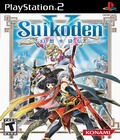Genre: RPG
Publisher: Konami
Developer: Konami
Release Date: March 21, 2006
There's an unwritten law about games in the Suikoden series that dictates, "The more exotic of a weapon used by the main character, the better the game will be." In the very first Suikoden, the main character turned heads by using, instead of the traditional heroic sword, a quarterstaff as his weapon. That feat has been duplicated time and again in various games, and isn't seen as too far of a leap; and in accordance, the first game of the series was good, but not particularly great. The sequel's lead wielded tonfa, a weapon that hardly gets seen in games not named Soul Calibur, and the game itself saw blazing success, considered by many the best in the series. Suikodens three and four starred plain ol' boring everyday swords, and were seen as progressively worse travesties to the series, though a few fans still stuck it out for hope of something better. Now, Suikoden V has come, and the main character finds himself tossing about a nunchaku-staff, more typically known as a tri-nunchaku. Does the oddity of his means of attack spell good things for the series again?
I won't mince words past this point. Honestly, and truly, the answer is yes. It's always a good sign when the reviewer would rather play the game than write the review, and this one's been keeping himself awake until sunrise for a week on end, playing Suikoden V to death. Things such as sleep, eating, writing a review – all of these are forgotten in lieu of more playtime.
For those who'd forgotten about the Suikoden series after the bland number three or abysmal number four, Suikoden V tells another daring tale of an unwitting hero getting a rune of exceptionally powerful power, and then gathering up allies to take down the overwhelming odds stacked against him. We're not just talking about a handful of party members, either; Suikoden has always been famous for its casts, spanning over 108 allies to befriend, or more.
In Suikoden V, your unwitting, nameless protagonist is the son of the Arshtat, queen of the Falena matriarchy. In other words, he's a prince in a land with no true need for princes. The story opens as he, his personal bodyguard, and a small group of others return from a survey of the ruined town of Lordlake, which was struck down by the power of the queen's Sun Rune two years ago and remains only in shambles. Gradually, like easing into a hot tub, the story slowly swells into being around you. Not all is good in the land of Falena. There's a power struggle between the two leading noble families – the Godwins and the Barows – and the queen seems to be losing control of herself due to the power of the rune she bears.
Naturally, it's obvious that things are going to go wrong, dragging the prince blindly into a whirlwind of deceit, betrayal, military coups and things generally being Not As They Seem. The nuances of the plot are subtle, however, and the game unfolds its very setting over the course of a good 10 hours of gameplay, clocking in at what might be the slowest introduction ever known to man, even though it's still a flash in the pan compared to the sheer colossal length of the game. Once the prince sets out on his own, of course, the game picks up pace. As he journeys, the prince of Falena gains unquestionable power, overcomes insurmountable odds, and, just like in all the other Suikoden games, if he collects all 108 of the Stars of Destiny, he can bend the very plot to his will!
Okay, so it's fairly easy to see similarities if you've played the past four games in the series. In fact, much like the rival Final Fantasy series, very little changes aside from the plot. However, this is a mixed blessing; true, it's all traveled ground by this point, but on the other hand, gone are some of the changes that Suikoden IV made for the worse.
Back are the six-person battles, completely free of pairing or overcomplication. In fact, the game's battles function nearly identically to those of Suikoden II, considered the best in the series for combat. The simple-yet-deep rune system is there as always, allowing each character to equip a number of runes which grant him the ability to cast magic, perform more powerful attacks, poison enemies with their attacks, and other such goodies. Also returning are the game's signature combo attacks, taking the power of two related party members (the prince and his bodyguard/attendant, for example, or a father and daughter couple) and either amplifying it or spreading it amongst several foes. The signature light humor in the combinations remains intact, and does a bit to lighten the tense mood.
Similarly gone is the need to pilot a boat everywhere; most of the travel to new locations, particularly at the beginning of the game, is by boat, but all of it is thankfully both autopilot and skippable. Likewise, the loading screens – while not totally eliminated – are minimized, taking less than a second or two between transitions, and are kept mildly entertaining by allowing a sprite-based look at one of the characters. In fact, for the gamers who have been playing the series since its heyday, it's a bit of a tragic look back at what could have been, had Sony not gone so anti-2D. Not everything is roses, however. One thing that should never have changed is the nearly real-time war battles.
Just like every other game in the Suikoden franchise, Suikoden V quite often deals in the brutal, widespread carnage of entire armies trying to decimate one another. Only in these epic campaigns does the one true flaw of the game come forth. Battles are waged both on land and over sea, running like a rough mixture of the wars in Suikodens two and four, while retaining the worst of both worlds. Troops move, act, and attack in real time, engaging one another whenever two opposing units meet. Combat is done in the typical rock-paper-scissors fashion here – archers beat lightly armored cavalry, whereas cavalry has an advantage over the heavier-armored infantry with its mobility, and infantry can easily steamroll over archers. Whichever of the two squads loses the melee retreats a short distance ... only to stupidly run back into the fray all over again.
The AI in these wars, both allied and opposed, is absolutely horrid, consisting of little more than "point A to point B" movement, regardless of the obstacles in the way. In addition, controlling units is like trying to bob for apples in molasses; response is sluggish at best and nonexistent at worst. In rather heated campaigns, this causes a sudden outcropping of a gamer reflex known as "flailing about like a chicken with its head cut off."
However, therein is only one flaw in an otherwise sparkling sea. Much like a painting, sometimes it is the flaws that make a masterpiece; after all, who could call it Suikoden if epic conflicts controlled with the precision of something like Romance of the Three Kingdoms? Likewise, the graphics range from "kind of blurry at long distance," as in the battles and the most comfortable walkabout mode, to "extreme close-up mode," which is surprisingly crystal clear. While action in the battles may move a little too fast for the subtleties to come through, it's obvious what's happening, and the battles do look clear and refined, if a little misty.
On the other hand, the Konami Kukeiha Club has done it again. Gone are the questionable overtures of more recent titles, and returning are the familiar, rural Celtic-sounding tunes of the first two Suikoden games. The soundtrack is easily on par with the first two games, perhaps even surpassing them, and the voice acting follows suit. It may not be the absolute best voice acting the world has ever seen, but it does its job admirably. It consists of a group of actors who, for the most part, actually sound like actors, instead of "read-out-loud-from-a-script"ors. There are a few characters that portray as much acting skill as a piece of wood, but they're few and far between.
 Suikoden V marks the end of an era – the era of lackluster, boring, and nearly blasphemous Suikoden games. Suikoden V brings back everything good about the second game of the series, while getting rid of a great many of the bugs that plagued the mid-life PSX title. It's not the perfect game; the pacing and response of army and naval battles are a trifle annoying, as are the constant loading screens. That's all that it comes down to, however: annoyance. If you can handle slight annoyances every now and then and can stomach a prologue sequence that makes the beginning of Kingdom Hearts 2 seem brisk and concise, Suikoden V is most certainly one of the best RPGs on the PlayStation 2, bar none.
Suikoden V marks the end of an era – the era of lackluster, boring, and nearly blasphemous Suikoden games. Suikoden V brings back everything good about the second game of the series, while getting rid of a great many of the bugs that plagued the mid-life PSX title. It's not the perfect game; the pacing and response of army and naval battles are a trifle annoying, as are the constant loading screens. That's all that it comes down to, however: annoyance. If you can handle slight annoyances every now and then and can stomach a prologue sequence that makes the beginning of Kingdom Hearts 2 seem brisk and concise, Suikoden V is most certainly one of the best RPGs on the PlayStation 2, bar none.
Score: 9.2/10
More articles about Suikoden V













 Suikoden V features unparalleled in-depth gameplay, a riveting storyline as well as the series trademark 108 Stars of Destiny. Thrust into a time of unbalance and unrest, a dynamic drama unfolds revolving around one of the 27 True Runes, the Sun Rune. Players are tasked to explore the lands of Falena, gather allies and become stronger to ultimately bring back peace and prosperity. While on their quest through rich 3D environments, exciting new secrets of the Suikoden world will be revealed!
Suikoden V features unparalleled in-depth gameplay, a riveting storyline as well as the series trademark 108 Stars of Destiny. Thrust into a time of unbalance and unrest, a dynamic drama unfolds revolving around one of the 27 True Runes, the Sun Rune. Players are tasked to explore the lands of Falena, gather allies and become stronger to ultimately bring back peace and prosperity. While on their quest through rich 3D environments, exciting new secrets of the Suikoden world will be revealed!




















